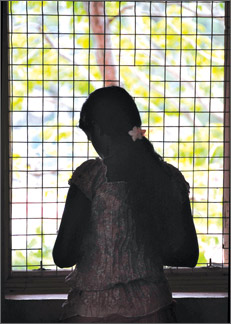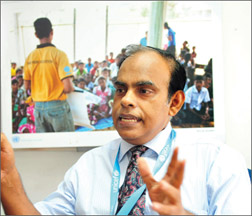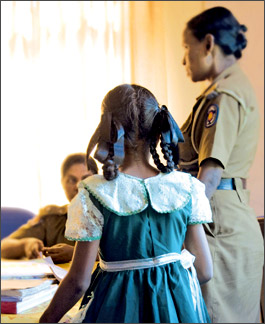Stop abuse now
Ruwini JAYAWARDANA
|

A distressed child.
Pictures by Earl Jayasuriya
|
We have heard of fantasy stories or real life incidents that are
either too good to be true, rags to riches tales or occurrences which
are so full of suffering and human misery that we have a hard time
comprehending its reality.
A majority of child abuse stories fall into the last category. Every
year tales of child victimisation are splashed across newspapers or
reported in the news generating shock waves across the society in the
island.
UNICEF Child Protection head Caroline Bakker states, "Case delays
lead to the further victimisation of those children who have already
suffered too much because of abuse and exploitation. Children caught up
in the lengthy justice process are voiceless, will lose out on the
precious years of childhood and have no means of redress for their
injustice. Meanwhile their offenders remain free and continue to commit
crimes against children with impunity."
As a result UNICEF Sri Lanka has proposed a plan to bring down the
time duration for justice for children in courts. The programme is
developed in collaboration with the Ministry of Justice, Attorney
General's department and Police.
Children are brought to courts for different reasons. One is for care
and protection. This may be because a child is abused and cannot remain
in the same environment as he or she had been living in before. Another
reason as to why children are called before the court is if they
themselves are perpetrators of crimes.
"You do not normally convict a child because they are individuals who
can be corrected. You send them to rehabilitation for this purpose. A
child could also be an eye-witness to a crime. Therefore he or she is
summoned to court to give evidence against for the case," UNICEF Child
Protection Specialist Dr Hemamal Jayawardena explained adding that the
police will not entertain a complaint related to a child if he or she is
less than eight years.
|

UNICEF Child Protection specialist Dr Hemamal Jayawardena |
"A court case could be conducted against a child who is between eight
and 12. The court would decide whether to prosecute the child or decide
if the incident occurred because of the child's immaturity. A liability
of a case against a child above 12 is perceived in the same manner as
that of a case against an adult but if the child is found at fault, he
or she will not be sent to prison if he or she is under 16. They are
sent to certified schools to learn from their mistakes. However those
above 16 could be jailed though he or she might come under the School
for Youthful Offenders under the Prisons Department," he said. Since the
age limit in which a case could be conducted against a child is low, the
Justice Ministry is considering raising it by several more years.
"Though the Judge may release the child, the fact that the child has to
go through the police is an issue," he stressed.
Cases concerning children for care and protection purposes are on
magistrate court level. The decision is normally attained in three or
four months. The second step in such cases is to prosecute the adult
responsible for the actions against the child. Such matters are referred
to the High Court.
Court cases
One third of the cases in High Court is related to children. These
cases usually drag on for a long span. The child is a victim as well as
a witness in this situation. A recent research done by the Forensic
Medicine Department of the Faculty of Medicine in Kelaniya University
showed that out of 110 cases studied 78 percent were on alleged sexual
abuse. Around 52 percent belonged to the adolescent age group (12 - 18).
Around 74 percent of cases were seen within 24 hours of issue of MLEF
but 5.5 percent were seen after seven days. 56 (51 percent) cases
examined did not receive summons/request from a relevant authority
indicating that either the cases were settled in the police or no
further investigations done. Around 80 percent of requests for MLR were
sent within three months. Taken to summons/request a report by the
relevant authority was 17 months while to receive a summon from the High
Court was 50.6 months (4.2 years). The time taken to give medical
evidence was 62.5 months (5.2 years) from the day of the examination.
Dr Jayawardena notes, "I recently gave evidence in court for a case
which had been pending from 1995. These cases drag on for years. A
victim of a rape allegation will not be able to put the experience
behind him or her and enter a new life because he or she is summoned to
court. This is also a form of secondary victimisation for the child
because he or she is not given the chance to move on. The child is made
to relive the trauma of an experience which dates years back."
|

A child in custody |
The child becomes a victim by the abuser, eventually he or she has to
tell the story to the police. In between he or she is exposed to
questioning by various people before approaching the authorities. Later
he or she has to repeat the details of the experience to the doctor and
the magistrate. It does not stop at that. Years later the child is
called to courts again to revive his or her memory of the experience.
"We do not take up the case for the interest of this particular child
who had been victimised but to send a message to the society that
perpetrators will be caught and punished. Since this is not happening
due to the cases being dragged on without a verdict we decided to take
steps into shortening the period of trial," Dr Jayawardena said.
The team launched their first pilot project in the judicial zone of
Gampaha and expanded it to Polonnaruwa. Later they took the programme to
Anuradhapura. Gampaha was chosen mostly for convenience because it is
close to Colombo but Anuradhapura and Polonnaruwa have a high rate of
child abuse cases.
Several sectors
"The delays can be divided into several sectors: pretrial, AG's
department and trial. Pretrial involves the police conducting
investigation, recording statements, putting the facts in order,
deciding to proceed with the case and getting reports across. Such
delays are due to lack of knowledge of the police and not being able to
obtain reports in time. With time passing the interest fades as well as
the ability to obtain evidence and information too becomes difficult.
That is why we decided to train the police and develop a system for
those working in the AG's Department to expedite the delays of such
cases," Dr Jayawardena said.
Childhood is the best part of a human being's life. You cannot give
it back to a child once you have taken those years away from him or her.
The damage is irreversible. We all have a role to play in not denying
the best part of the life of a human being.
The team has developed a means of identifying such cases by
accommodating the data in a file with a yellow sticker. Within 24 hours
the OIC of the police should send a basic note of the procedure of
events to a Deputy DIG and AG's Department. Within one month the data
should be obtained and sent to the AG's Department. If the file does not
reach them, they will check up on the delay.
AG's department has to file or release the suspects within one month.
Since the suspect needs to be charged beyond any reasonable doubt that
he or she committed the action at the High Court, the evidence should be
intact. If you know that the case will be a failure, the AG's department
would not pursue the matter. There have been many such unresolved cases
in the pipeline which have no basis and had been pending for years.
"These have to be handled by State Counsels. There is carder for
state counsels. We cannot put money and get them. We can only get them
assistants to do the legwork. Attorney General Shanthi Eva Wanasundara
is very supportive towards the project," Dr Jayawardena expressed.
Trial delays occur because of the case getting postponed. Due to this
the suspect, witnesses and other evidence cannot be found. However if
the delays in the pretrial and AG's department is solved, these delays
will automatically be solved. The judges are also requested not to
postpone the case and to call these cases first for hearing and change
their attitude towards child related cases. "We started training
programmes with the judges even before the pilot project. This created
the environment to incite the project. We have a lot of people who back
this programme," he said.
Speaking to 'Daily News Punch', AG's Department Solicitor General
Yasantha Kodagoda said that they have been practising the new incentive
for around two and a half months. "The AG's department, Justice
Ministry, Police Department and Health Ministry work together in this
programme. We look to achieve two primary objectives though this system:
expedite the passage of cases of child abuse through the criminal
justice system and to prevent or minimize secondary victimisation of the
child.
The incentive took off on October 15. We will be expanding the system
to Jaffna, Badulla, Hambantota and Kurunegala in early and mid 2012. If
the first pilot project proves to be a success, we hope to expand it
island wide," he said. |



